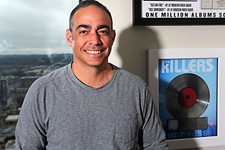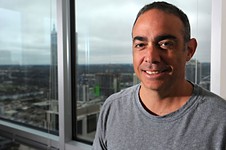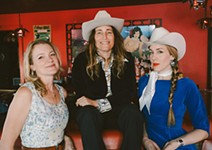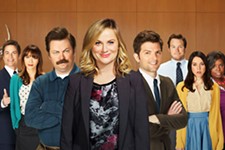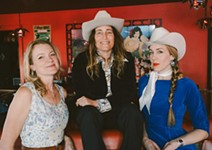Charles Attal Discusses C3/Live Nation Deal
“We needed each other”
By Raoul Hernandez, 7:07AM, Thu. Feb. 26, 2015
“This business is all relationships,” nodded Charles Attal in an exclusive interview at the Chronicle last week about billion-dollar concert giant Live Nation acquiring “a controlling stake” in C3 Presents. Myself and two of the three Charlies – Attal and Charlie Jones – bonded over our fledgling local careers 20 years ago. That yielded the following.
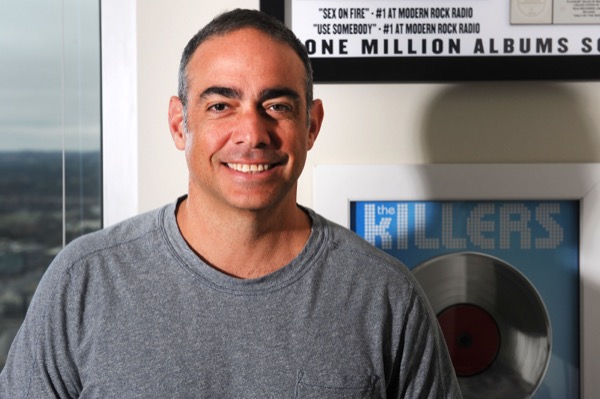
Austin Chronicle: For the layman, please explain “acquired a controlling interest.”
Charles Attal: It’s different for every company that gets acquired. For us, it doesn’t mean anything drastic. We’re staying C3. There’s nothing changing in our business model. There’s no Live Nation employees coming in to run our company. Me, Charlie, and Charlie are still running the company. They’re helping us grow.
We’re in 14 countries now, so for us, it’s a little less stress of trying to jump off a cliff in every single market we go into. And more infrastructure. They have more infrastructure around the world. If we go into Berlin, they have people in Berlin to help us. If we go into South America, they have people in South America. It’s more infrastructure for us to grow. That’s what it meant.
AC: So Live Nation now cuts your paychecks.
CA: They write my check. I have a boss. [Live Nation Entertainment CEO] Michael Rapino is my boss. Great guy. [Pause.] Damn, no one’s ever asked me that! I have a boss? Fuck! [Laughs.]
AC: Contractually, you and your partners are guaranteed jobs for a certain period of time.
CA: Yes. It’s a normal employment agreement.
AC: How long?
CA: A long time. I can’t say exactly how long, but a long time. We’re not going anywhere.
AC: But Live Nation owning a “controlling interest” means they could potentially sell the company.
CA: Not really, no. There’s a board of directors, and we represent seats on the board. We still run the company. We’re managers of the company. I don’t see any scenario where they would actually sell us. I can’t speak for 10 years down the road, but I don’t see anything in the next five to seven, eight years other than us growing our business .... We still own the other half of the business. We only sold half the company.
AC: Billboard put the sale price at $125 million based on C3’s reported review from 2013.
CA: None of the numbers in the press are right. I’m not at liberty to say what we sold for, but the numbers aren’t right.
AC: Was that number in the ballpark?
CA: I can’t comment on that.
AC: The New York Times reported last October that it was $250 million. That’s a lot of discrepancy between the two figures.
CA: I can’t comment on the price, I’m sorry.
AC: How does one arrive at a sales figure?
CA: Live Nation wanted to buy it, because we’re growing in the festival market and they wanted to grow in that market as well. We needed each other. We’re pretty established in the festival market. We have more coming, and we were at the point where it’s me, Charlie, and Charlie trying to make decisions to go into Colombia, and Berlin, and Singapore. There’s real risk out there.
It’s important knowing that I can go to the Live Nation office in Singapore, for example, to help with some production or with whatever the marketing would be there. It just got so cumbersome for us that we needed a worldwide partner to help us continue to grow without feeling like you’ve jumped off a cliff financially every time you make a decision that can affect you in the tens of millions of dollars.
We went into Australia, and you saw what happened with us losing a ton of money on Big Day Out last year. That’s a hit.
AC: What went wrong with Big Day Out?
CA: We probably should’ve stuck with out program that we do over here. Instead, we went to same old model that used to run. Remember when Lollapalooza was a touring concern? That model was already waning off here, and we should’ve known better. They need to make destination festivals. The touring festival is not working as well in Australia.
We should have gone into Melbourne and Sydney, probably, and branded it that way. Maybe flip-flopped the weekends like Reading and Leeds in England. I don’t know exactly what we should’ve done, but it shouldn’t have been a touring festival. Those days, I think, are moving on.
AC: With the collapse of the traditional major label system and continued erosion of album sales, is the music business now about festivals?
CA: It’s about the live space. Eighty-five percent of a band’s income is live, so everything now revolves around how to promote a record around a tour. A lot of bands launch their record around Lollapalooza, or Coachella, or Bonnaroo, or ACL. And South by Southwest, of course. So we’re now the product managers. The live space is the product manager.
We coordinate with labels and bands, who say, “We’re launching the week before, can you help us with promotion on site?” “Well, we have 120 media outlets on site at Lollapalooza, so yeah, we can help you navigate through some of that.” That’s why I think festivals are so important for the artists.
AC: How long was this deal in the making?
CA: People have been trying to buy us for years. We’ve had a lot of different companies approach us. Again, Michael Rapino is the reason we did the deal, and Live Nation is a great company. He understands our business. He knows the nuts and bolts of our business. He’s great and we get along with him well. We already did before. It was just an easy fit, whereas some of the other companies might not have fit as well. Like I said, over the years, we’ve been approached by eight or 10 different companies.
AC: In practical terms, how long did it take to put the sale together.
CA: A year. And it happened organically. We were not out shopping our company. We started talking, it grew into a structured deal, and then we ended up selling a piece. Once the deal was agreed to, it took three or four months to get it organized. It was a little over a year the whole process.
AC: When the rumor broke at ACL Fest in October, y’all were nearing the finish line.
CA: Yes, we just weren’t done, so we couldn’t talk about it. You don’t want to jinx it. You don’t want to talk about a deal until you’re inked.
AC: Charlie Walker came from Live Nation. Was he the bridge to the deal?
CA: Correct, and he already had a great relationship with Rapino. Charlie ran North America for Live Nation for Rapino in the early days, so I got to know Michael through Charlie, and he’d always been mellow, great. He’s a great CEO of a company. Charlie helped bridge the gap for us, and it made it pretty seamless.
AC: Must be hard to sell you business.
CA: It is, but the way our deal’s structured, we’re still running the company. We answer to Michael. All he wants to do is help us, so he’s not calling us. It’s not what you think of some CEO breathing down your neck. He’s like, “How can I help? Where do you need help? Here are our resources to do that.” But it doesn’t feel any different, because it’s the same people at the company, the same vibe. No one’s flying in from Live Nation to run a piece of our company.
AC: Approximately how many people does C3 employ?
CA: Here in Austin, I think we have 160. There’s Fresh & Clean in L.A., which is the media company. They have eight, 10. Roughly 175. As we grow, it’ll go up, and if we take a hit on five festivals, it’ll go down. It’s a normal business. As long as we’re growing; we’ve already added probably seven employees since we did this deal.
AC: What typically makes people nervous about these sorts of deals is that overhead costs are generally passed onto the consumer. Live Nation pays millions for C3, and even more to secure a huge tour, and that translates into higher ticket costs.
CA: We run off our own P&L [Profit & Loss], so when it comes to the day-to-day operations, we’re running the business. When we do budgets and we’re putting our lineups, they’re only there to help us. They’re not there to say, “You need to do this, because we have to bring our revenue up.” They’re smart enough to know not to ruin the models we’ve built that are working.
Now if something’s not working, they’re gonna come and try and fix it, but there’s no reason to come in to ACL and try and fix it. ACL’s working. Lollapalooza’s working. So I don’t think there’s going to be any detriment to the consumer. I think it will actually be more consumer-friendly if we could use more of their technology and marketing to go with our ticketing.
AC: Another concern for the consumer is talent.
CA: Amy [Corbin] is still booking ACL. I’m still dealing with headliners. No one at Live Nation even calls us about it.
AC: Could there be a scenario where Live Nation says, “Okay, you’ve got the Cure and Depeche Mode, but we really need Flock of Seagulls to headline.”
CA: No. Absolutely not. No way. We’re only going to book what we want to book, and that’s what Michael wants us to do. He knows we know our business. I don’t think one band is going to be forced onto a festival to mess up a festival. Festivals are big revenue generators – big business – so there’s no reason for them to start force feeding bands to mess up the vibe of the festival. That doesn’t behoove them at all. I don’t ever see that happening.
AC: Does it work the other way? “We got the Cure and Depeche Mode, but we want U2 – can you help us?”
CA: Without a doubt. I would love to be able to lean on them if they have the relationship. We haven’t gotten into that yet, because it’s so new and everything’s booked, but I’d love to be able to make phone calls to some of the people that are managed by [Artist] Nation and say, “Hey, are you interested?” and have that direct line of communication.
AC: So we don’t have to worry about Asleep at the Wheel no longer playing ACL?
CA: No. No, no, no. no. no. no. no. Asleep at the Wheel is always going to be opening the festival. I don’t need Ray Benson calling me up and yelling at me.
AC: What does this deal mean for C3 properties like Emo’s?
CA: Nothing. Nothing changes. Emo’s is owned by C3 [and thus an asset of the sale], but Stubb’s is owned by a different entity. Everything stays exactly the same. I’m trying to think of one thing that will change, but there’s nothing. No one came into say, “Let’s do this, this, and this.” They said, “Go. Let us know what you’re doing. Keep us informed.”
AC: Is there then more capital at your disposal? You get a wild hair and now you want to buy the Austin Music Hall. Would this deal facilitate that?
CA: Yeah, we could broach that. We haven’t yet, but if the opportunity comes up and it’s a good business model, I don’t think any business would turn their head to it.
AC: So nothing changes with the other rooms you book – Lamberts, Parish, Vulcan Gas Company? How many rooms locally does C3 book?
CA: Everything stays the same. It’s not a matter of what rooms we book. It’s about where the bands want to play. If we have a relationship with a band, we’re going to put them where they want to be. We do one-off shows all over the country. If I force feed a band into a room they don’t want to play, guess what, I’m in big trouble.
AC: If nothing’s changing, what does this deal mean to Austinites?
CA: Nothing. It’s business as usual. We did it to help us expand worldwide without us having to stress the pain of taking a hit – in Australia, or Berlin, or in markets we don’t know as well, but we know we want to be there. We like the site. It’s a lot of heavy lifting. It got to the point where it was painful for us.
I’m enjoying my job again. I’m able to look for opportunities where I normally wouldn’t, because I’m always worried I’m going to put the company in a ditch. So, I’ll probably take a little more risk and not have that stress of having to lay off a bunch of employees. That’s stressful.
AC: This gives you a net?
CA: I don’t know if it gives me a net. It just gives you some comfort that you can start ....
When I was younger, we were dumb enough not to have any fear. Right? Now, we’re older. We all have kids. We have a little more fear as we tip-toe or even jump into other markets. It just takes a bit of stress off, that’s all.
AC: Does it take stress off to the point that it frees up the partners to diversify within the company?
CA: I think everybody’s going to take a more aggressive approach on how we grow. Like we used to 10 years ago.
AC: Can you give me an example?
CA: If an opportunity comes up in Little Rock, Arkansas, and normally I wouldn’t be in Little Rock but it looks like a great opportunity and it could be some risk, I think we’ll probably take a little more risk. We took a lot risk [back] in the day. And then we kind of sat back for a minute and got nervous about taking risk, because we’re like, “Hey, we’ve got kids. We’ve have families.”
Before, we had no families, we had no kids. We just ran with it. It’s different for us now. And, if we put it in the ditch now, there’s a lot of people at stake. Before we had 20, 30 people. That’s stressful.
AC: Do locals benefit from an Austin company branching out into Australia, Berlin, Singapore?.
CA: It only helps the local community, because it helps the access to artists. ACL is going to have great artists every year. We’re not on an island; we’re not trying to figure out what talent’s what. We have access worldwide to see what’s happening, and we’re going to bring best cases to the city.
AC: Has that happened?
CA: It does happen. I can’t tell you a name, because all the bookers are all over the world discovering new talent. If they start going off the tastes of what I like at 47, then ACL would probably be in the ditch [laughs].
We develop relationships with artists worldwide now. This business is all relationships – managers, agents, bands. It just gives us more exposure, and we’re able to have better relationships worldwide, which helps us bring more artists to Austin.
AC: This was an investment in your company, but just how nervous were you selling off a part of something that took so long to build up.
CA: After negotiating the deal, I was not nervous at all. At first, I was nervous. “Everything could change,” blah, blah, blah. But I’m pretty happy with it at this point, because nothing is changing at our company. Everybody’s secure. Everybody’s got jobs. Everybody’s excited because maybe they can work on something new. Obviously it’s your baby, so it’s... emotional. But it’s business as usual.
AC: When a deal like this goes down, the first thing the man on the street does is cry sell-out.
CA: Right.
AC: Yet isn’t it a case that any small business owner is building up his company in order that someone might offer them millions of dollars for it?
CA: It wasn’t the reason why we did it. As you get older, things change in your life. You’ve known me since day one. We did this for the love of music. We were 24/7 in it. We were living in it. I’d see you at shows. We would be side by side watching the bands play. This is what we do. We love music. That’s why you’re in it. You love music.
Now I don’t even know if we would’ve sold a piece off if we hadn’t grown the footprint so worldwide. I wouldn’t even say it’s bittersweet. For us, it’s just another step to growing our business. We needed help to grow our business.
AC: What was it that pushed C3 outside city limits originally?
CA: It was organic. It was incoming phones calls: “Hey, can you help us here?” Some of them looked great and we would do them, and some of them we were like, nyh. It was very organic. We weren’t looking to grow globally. It just happened that Walker had relationships. Jones had relationships. I had relationships. And it just trickled out. Eight, nine years go by, and you’re like, “Wow, we’re in 14 different countries. That’s when we were like, “We need a little bit of help here.”
AC: Was there a notable event that pointed the way?
CA: Lolla[palooza] Chicago [2005]. That was a massive show. It was a big undertaking. We took a lot of punches at first, working downtown in the city. They’ve been great with us over the years, and we’ve learned how to operate in the city of Chicago. They’ve embraced it. It took a long time to embrace the festival there, and it’s running better now than it ever has – as an operation.
AC: That was a light bulb moment for the three Charlies?
CA: Yeah. We’re like, “Hey, we can operate in other markets.” That’s where we went.
AC: Where to from here?
CA: We have a bunch of stuff we’re getting ready to launch. Those will be out in the next month or so.
AC: Eyes set on the Far East market?
CA: We do, but we won’t be there in the next year. We have two or three other things we need to launch before then. We’re doing Lolla Berlin this year – for the first time. Then there’s some more stuff in the States, and some more in South America that we’ll be launching soon.
AC: What does a deal like this mean for you personally? Whatever the payout, it’s probably safe to say your family need never worry about money.
CA: Doesn’t mean anything for me.
AC: Your kids won’t have to worry about going to college. Your parents won’t have to worry about their retirement.
CA: My kids aren’t getting any of this! They’re going to work their you-know-whats off! I’m kidding. I don’t even think like that. I’ve never been driven in this business by money. Ever. If I did, I would be in a different business. It’s a nice perk, but nothing changes in my life. I just keep going about my day-to-day business, and my kids, it’s good for the kids, I guess. Yeah, I’ve never dug in and thought about it. I’ve never been driven by money.
AC: From your vantage, what is C3’s profile in Austin?
CA: I don’t know, man. I try not listen to it. A lot of it’s just talk. People who are talking bad about companies, they don’t understand the business. It’s not rocket science what we’re doing. We’re promoting concerts. We’re just producing shows. I try not to think about it. I focus on our day-to-day operations. If people want to talk good about us, or bad about us, it is what it is.
By the way, we were the indie promoter. We’ve always been the indie promoter. Did you ever come to – back before I was in the music business – to the Clown Meat shows? ’92? I came from the indie world in Austin, and we just organically grew. We weren’t trying to take over markets. We grew from a small indie to a midsize indie company. I think people think we’re this big corporate giant, but it’s just a concert company.
AC: What’s the secret to your success then? For some tiny promoter reading this, how do they get to be Charles Attal?
CA: For the first 15 years of my music career, we just worked 24/7. You have to be passionate about it. If you’re not passionate about what you do, then you have to do something else. We were passionate about it. We were there. We were there working in the mornings. We were at the shows at night. Sometimes you got up the next morning not feeling that great. We lived it 24 hours a day, and it just organically grew into this company.
I wish I could say there was this blueprint, but we just went with our gut. Sometimes we got knocked in the face, but then we just powered through. As long as we didn’t put our company totally in the ditch, we were okay.
AC: Does it take capital to make capital? How much did your family help you out at the start?
CA: My dad loaned me a very, very, very, very small amount of money to invest in Stubb’s. He turned that into equity and it’s probably one of the best investments he’s ever made [laughs]. I didn’t borrow any money other than that. We just got lucky.
AC: You see an organization like South by Southwest, which has done a tremendous amount for Austin, and yet locals often vilify them because they’re successful.
CA: South by Southwest has done so much for the city. It brings in so much revenue, and so much worldwide awareness that Austin’s cool. The reason Austin’s growing as fast as it is is because of South by Southwest. People from all over the world know what South by Southwest is. I think South By put Austin on the map. Worldwide. Culturally.
AC: By that same standard, do you feel C3 doesn’t get enough credit in Austin?
CA: I’m not looking for any credit. We don’t want any credit. We just want to keep doing what we’re doing. I’m from here. I’ve been here my whole life. My family’s been here my whole life. And I take pride being in this city, so I just want to keep pushing and helping and trying to make sure everybody’s happy in the city for the music community [laughs]. You know? The music community stays happy because it’s a good community.
AC: Who are your favorite groups? Who’s on your iPod? What does Charles Attal listen to?
CA: Okay, this weekend I was listening to Kendrick Lamar. I was listening to Willie Nelson. I was listening to Ray Charles. I was listening to Vance Joy. I was listening to Townes Van Zandt. This is everything I listened to this weekend. Everything I was listening to keeps popping in my head.
I was listening to ELO, because I just saw them on the Grammys. There’s been a battle with me and Amy about putting ELO on ACL. She’s younger, so she didn’t live the ELO experience like I did.
AC: Do they tour?
CA: Yeah, they work. Yeah. Let’s see, who else was I listening to this weekend. Thin Lizzy [laughs].
AC: In high stress, what music do you go to?
CA: Man, it’s old blues, old jazz. The Staple Singers. When I get home and my head’s exploding, I put on some old gospel, or something that brings me to chill mode.
AC: You’re furiously trying to hit a deadline and you need something upbeat.
CA: Pearl Jam. I love Pearl Jam. Staple Singers to Pearl Jam.
AC: Who’s someone you’d like to bring to this market?
CA: Tom Waits. I want Tom Waits on ACL. That’s my dream. Lou Reed was one. That was awesome having him on Lollapalooza. The old greats. The guys I grew up with. That’s who I want.
AC: ELO ....
CA: Ahhh, I’d love to do ELO. I’m going to go battle Amy and see if I can get that going.
A note to readers: Bold and uncensored, The Austin Chronicle has been Austin’s independent news source for over 40 years, expressing the community’s political and environmental concerns and supporting its active cultural scene. Now more than ever, we need your support to continue supplying Austin with independent, free press. If real news is important to you, please consider making a donation of $5, $10 or whatever you can afford, to help keep our journalism on stands.
Raoul Hernandez, Feb. 27, 2015
May 10, 2024
May 3, 2024
Charles Attal, C3 Presents, Charlie Jones, Charlie Walker, Amy Corbin, Live Nation Entertainment, Michael Rapino, ACL Fest, Lollapalooza, Tom Waits, ELO





